The Ultimate Student Travel Guide to London
London is one of our favorite cities in the world and one that we recommend every traveler to visit.
If you're a student heading to London for the first time and want to know what to expect, this article is for you. In it, we share some of our favorite hangouts, how to save money on accommodation, and how to save money on, well, pretty much everything.

Basic Traveler Information
- You need a passport to travel to England.
- You do not need a tourist visa in London.
- You do not need shots before you travel to England.
- You should make reservations in London.
What to Pack
Think of the U.K. as the Pacific Northwest of Europe. It rains, a lot.
One packing essential, then, is a small umbrella and a light rain jacket that can be rolled into a small ball to fit inside your backpack. Remember to bring a travel adapter with a voltage converter built in so that you don't end up exploding your hairdryer in the hostel dorm. Another good idea is a pair of comfortable walking shoes. London is an enormous city and you'll most likely spend your time walking from one tourist attraction to the next.
Other than that, the U.K. is very similar to the U.S., so you should pack whatever you would take on a domestic trip. If you happen to forget something important, you'll be able to replace it in London without a problem.
How to Get There
You'll find the best airfare to London from student airfare agencies like STA Travel. Watch for specials and you could easily pick up a return from around $500. Don't be fooled by some airlines' "student airfares" -- student airfare agencies have the real deal. Airfare sales do happen, though -- check student airfares against an aggregator's roundup of regular ticket prices.
Where Should I Stay? How Much Will It Cost?
One of the cheapest areas of London is the neighborhoods in the east and south of the city. A couple favorites include Hackney, Shoreditch, and Brixton -- they're all hipster areas with fantastic food, bars, and coffee shops. They're a little way outside of the main attractions, but most things are still within walking distance, and using the underground is easy.
Even though there are cheaper areas of the city, London is still one of the priciest places to visit. Opt to stay in a dorm room in a hostel to save money, but you'll still be looking at $20-30 a night if you do so.
Getting Around
The London tube is a major miracle of modern transportation, and you'll most likely spend a significant amount of time on it. Though it's the oldest in the world, London's subway is clean, safe, and efficient. Although expensive, because... London. If the tube doesn't take you close to your London destination's door, the bus (maybe a double-decker!) will.
Plentiful black London cabs have fixed prices and Uber is everywhere within the city. In short, you'll never struggle to get to where you need to go in London.
British Money and Creating a Realistic Budget
England's currency is the pound and you won't be able to spend any other currency within the country.
London is still expensive, though, so you should plan on spending around $55/day. Food and beds are pricey but museums are free. You can skip out on the food scene by cheaply cooking in your hostel kitchen, but you definitely shouldn't miss out on the food markets like Brixton Village, Borough Market , and Broadway Market if at all possible.
Things to Do
London's history is long and deep -- do tour the Tower of London for an introductory insight into it. Borrow someone's copy of the Time Out music/film/event guide or check Time Out online for a highly comprehensive list of what's happening in London while you're there.
Consider buying a one-day Original Bus Tour pass to hop on and off at major sites.
Spend whole days hanging out in places like Piccadilly Circus or Covent Garden, and check the top free things to do in London .
Safety, Crime, and Travel Healthcare
The artful dodger does lurk in the London tube. You can feel physically safe in all of London provided you use basic travel safety precautions. Terrorism is not a big concern, despite some U.S. hysteria over the '05 tube bombings.
U.S. travelers get free emergency room care in London; all else is pay as you go, though your U.S. health insurance probably covers you. Food and tap water are perfectly safe in London.
Mail, Internet, and Phone Calls
You can buy local SIM card for making calls and using data in England for around $20 USD (for 1 GB of data and some calls and texts) in U.K. convenience stores and phone stores, like Vodafone or EE.
London has free Wi-Fi all over the city, so if you don't have an unlocked phone or don't want to buy a local SIM card, you shouldn't have any problem getting connected. Hostels and hotels typically offer free Wi-Fi to their guests, as well.
Tour Groups
Visiting London is so expensive that going with a tour group is a great idea -- it can be cheaper and much easier than visiting on your own. Several companies specialize in student group travel -- try EF Tours for a very decent experience.
Nearby Destinations
Ireland is home to cheap European air champ Ryanair, which departs from many London airports and gets you around Europe and to Ireland. Take the Eurostar to Paris, Brussels, or Amsterdam to catch a European train with a Rail Europe pass. Ferries exist, too.
Travel Tips for Visiting London on a Budget
How to Enjoy a Quick Layover in London on a Budget
Your Trip to Birmingham, England: The Complete Guide
How to Rock Your First Solo Trip Overseas
10 Questions to Ask Yourself Before You Plan Your UK Trip
Tips on How to Save Money when You Visit Toronto
Step-By-Step Budget Tips for a First European Vacation
Your Trip to Edinburgh: The Complete Guide
About Single Europe Train Tickets
Will Your Mobile Phone Work in Asia?
Surviving Singapore on a Budget
Your Trip to Vancouver: The Complete Guide
9 Top Things to Do in London for Easter
What $100 Can Get You in Southeast Asia
Tulum Travel Guide - Budget and Tulum Travel FAQ
Best Online Travel Agencies
Privacy and Cookie Policy
- Universities
- Business Schools
- Language Schools
- Students' Unions
- UK University Rankings
- Course Subject Rankings
- UK Business Courses
- World University Rankings
- Online Language Learning
- Immigration Lawyers
- Search UK Listings
- Accommodation Guide
- Currency Exchange
- Online Shop
- Sign-up to Newsletter
- UK Shopping Guide
- Flights & Airports
- Buses & Coaches
- London Transport
- Student Travel Guides
- Hostels & Hotels
- Insurance & Safety
- Student Travel Top Tips
- Student Tours
- Contraception Advice
- The Royal Family
- Foreign Fridays
- The Weather
- London 2012 Olympics
- Bank Holidays and Festivals
- Stereotypes
- Upcoming Events
- Bars, Pubs, Clubs
- Restaurants and Take-Aways
- World Cinema
- Buy Tickets
- Online Games
London Public Transport
We realise that being a foreign student in a big city like London can be a bit overwhelming, especially when trying to take public transportation. Do not worry! We have broken everything down for you so that you can get to where you want to go without any troubles and for the cheapest price.
You can buy an Oyster or travel card here:
Planning Your Journey
- Before taking the Tube, always check to see when the first and last trains are.
- The first thing you need to know is what tube station you are leaving from and at which station you will need to arrive at.
- Once you know where you are leaving from, check to see where your station is on the underground line. Locate your destination and the underground line that it is on.
- Remember to check the train's destination, which can usually be found on the front of the train or on the display boards, to make sure that you are getting a train going in the right direction – and that if you need to change lines, you keep going the right way!
- Note: Sometimes trains do not travel all the way to the terminal station and will terminate a few stations before. There will usually be a train that goes to the end of the line shortly afterwards, but it means that you may have to get out and wait at the platform for a while.
Oyster Cards
An Oyster Card is a pay as you go travel pass that you can use for the underground, bus, tram, DLR, London over-ground trains and some National Rail train services.
There are two advantages to having an Oyster Card. Firstly, they are so convenient. When you've just arrived back in London from your summer holiday, the last thing you want is to be messing around buying a Travelcard every day. The other major benefit is that Oyster Cards make travelling much cheaper. It will always calculate the cheapest price for your journey, and paying for a journey with an Oyster Card costs a lot less than buying a paper ticket.
There are two types of Oyster Card:
Standard Oyster Card
You can pick one of these up from selected high street shops or at most train stations in London, or get it delivered within the UK. They are free but have a refundable £5 deposit. They can have season tickets placed on them, be pay as you go, or auto top-up.
Visitor Oyster Card
If you want to get your Oyster delivered abroad before you arrive in London then this is for you. They have a £3 non-refundable deposit and you can get them already topped up when they arrive.
Order One Now
Make sure you touch your Oyster Card to the yellow sensor at the start and the end of your journey. If you forget to touch in or touch out, you will be charged the maximum daily fee.
If you travel during peak times, Monday to Friday (4:30–9:30 in the morning) you will be charged more for your journey.
Student Oyster Cards
Student Photo Oyster Cards are available to students over the age of 18 and enrolled at a participating university or institution. Although you can still use the Student Oyster Card for pay-as-you go travel, no additional discounts are available for single journeys, daily travel or 3 day travel. The Student Oyster Card allows you to spend less money on travel in and around London when you purchase Travelcards valid for 7 days, one month or longer periods of time (up to one year). You will end up saving 30% off the adult fare for that Travelcard. Eligible students must apply for a student oyster card online or by post through their university or institution. Contact your Student Union or the National Union of Students for more information.
If you are under the age of 19 and in full time Education in the UK, you may qualify for the 16+ Student Oyster Card, which will entitle you to free transport on London buses and trams and allow you to purchase Travelcards at a child's rate.
You can purchase a Travelcard valid for transport on the underground, London over-ground trains, DLR, tram, schedules riverboat services and some National Rail services for anytime travel or off-peak travel (travel starting after 9:30 in the morning). You can also purchase a travel pass only valid for the bus and tram network in London. This pass will not allow you to travel on the tube or on any trains.
National Rail Cards allow you to have unlimited travel on National Rail services between the zones specified on your card for the duration of your card. Students holding the National Rail 16-25 cards can purchase travel cards at the off-peak rate, which is a great deal and can save you 50% off your travel costs.
Before taking the bus, always check to see what the times for the first and last buses are. It is also a good idea to check if there are any delays or closed routes by using the Journey Planner.
For bus route map and timetable information, check TFL. You can also use the Journey Planner to find out which bus you will need to take in order to reach your destination.
When you arrive at the bus stop, make sure the bus you need to take, stops at that station (bus numbers are listed on white plaques at the stop). If it does not, look to see if there is any other bus stop nearby or ask a local shop owner for help.
When you arrive at the correct bus stop, check the route map to make sure your bus is heading in the correct direction. If you are unsure, check the front of the bus to see if its last stop is in the direction you wish to travel.
If you find that the bus is heading in the opposite direction to the one in which you want to travel, you will probably need to cross the street to take the bus heading in the right direction.
If you have an Oyster Card, make sure to touch in, but you will not have to touch out. Sometimes, you will be allowed to buy a bus ticket on the bus, although not usually in Central London. Check around the bus stop to see if there is a machine to purchase tickets before your bus arrives.
Night Buses
Night Buses are run on a limited service, late at night. The Night Bus service usually starts after midnight. The routes are much longer and the stops are less frequent. Students usually take the Night Bus to get home after a late night out because it is the only mode of public transport to run through to the early hours. To find out which Night Bus services your area, check at bus stops near you or use the Journey Planner. Night Buses have an "N" before the route number e.g. N11.
In London, you have two cab options: Registered Black Cabs and Mini-Cabs.
All airports have a Black Cab service. Riding in a Black Cab can be a great experience for a foreigner, as the cab driver will most likely tell you about picking up members of the Royal Family, celebrities and other interesting people. They are also quite knowledgeable about London and if you ask, they will probably tell you what you want to know.
However, if you are not careful, you can run up a hefty bill in a Black Cab. All the cars run on a meter that charges per portion of a mile and per minute stopped. If you hit some traffic, you will be broke in no time! Though they are convenient, they are not the best way to save money.
Mini-Cabs are the way to go if you want discounted taxi transportation. Unlike Black Cabs, you cannot hail Mini-Cabs on the street.
You have to call a Mini-Cab station and they will send you a taxi if you have not pre-booked. Mini-cabs charge for the entire journey, regardless of traffic. When you want to book a Mini-Cab, make sure you call the nearest company to you, as they will most likely be the cheapest.
There are also Mini-Cab companies run by women only for women, so if you are a female and you are wary of cab drivers, know that there is another option for you.
18 Top Tips To Make The Most Of University In London
Welcome to the best student city on the planet (and the best student guide in town)!
And that’s not just us being biased, London was officially ranked the best student city in the whole world . Congratulations on joining us in the capital! While you’re pretty much guaranteed to have a great time here, we thought it would be handy to give you a few top tips. Our student guide will help you get your head around the underground, dig out those discounts, and discover the exciting places to visit in every corner of this amazing city!
1. Go to the best events using the Fever app

This app can get you some nifty discounts on the top events in London, including brunches , cocktails , tourist attractions, cinema tickets , boat parties … basically everything and anything you can think of! It’s also great just to keep up-to-date with what’s going on in the city. Download it on the App Store or Google Play .
2. Head in the right direction using Citymapper
Your atlas, your tour guide, your London bible. Download this app and never let it go.
3. Travel around the city for a discounted price

In order to explore all the amazing things this city has to offer (while completing your degree of course) you’re going have to do a lot of travelling. There are various ways of getting your hands on some discounted travel – whether you choose to buy an 18+ Student Oyster Photocard, a 16-24 Railcard, or both! Individually, the two cards get you at least 30% off travel.
For all the information you need about student travel in London, visit the TFL website here .
4. Find somewhere to live using this secret TfL travel time map
It may not be the prettiest to look at, but this map sure is useful when it comes to finding places to live near where you will be studying or working. The quicker the commute, the better!
5. Monitor your money

A obvious point for a student guide to make, but it’s so much harder in practice. We know that student loan feels like it will last forever, but trust us when we say it really, really won’t. Give yourself a head start by managing your money from the get-go: get a Monzo account , or download a budgeting app .
6. Use your student discount for other things too
Student discount is now your best friend – whether it be for clothes or cinema tickets . Every penny counts!
7. Tune in for the tube
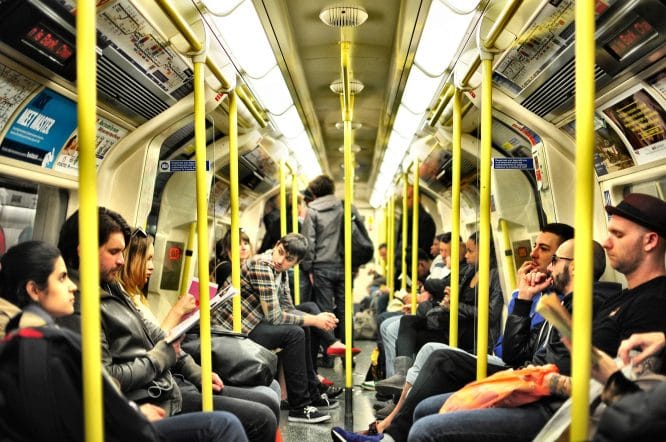
For the times when you do inevitably have to get the tube, it’s a great idea to download music, podcasts or audiobooks beforehand, as there isn’t any phone signal down there. There’s also nothing wrong with a good old fashioned book for those longer journeys!
8. Get lean and go green
Why burn a whole in your wallet, when you can burn the calories instead? Here are eight London tube journeys that are actually quicker by foot . Some of them take half the time to walk!
9. Stay happy at happy hour (luckily we’ve done it for you)

When you do reach your destination, you’re going to want to save that student loan from running out before Christmas. Take a look at these brilliant tube maps which show you the cheapest pint near every station and the best happy hours in the city !
10. See the city…for free!

People may tell you living in London is expensive, but what they don’t tell you is that no other city in the world has more or better free things to do than London (again, not just our words, but that of travel gods, The Lonely Planet ). To make things easy, we’ve listed 175 free things for you to take a look at!
11. Explore the outskirts
While many of your friends may be joining you for university down in London, it is likely you will all live and study areas all over the city. ‘Meeting in the middle’ may sound easy, but finding each other amongst over 8 million other people can become quite the challenge – and there’s plenty of intrigue further out !
Guy, our head of content, was all to familiar with this problem back in his uni days, which he said was ‘generally a disaster’.
‘You end up trying to go for drinks on Warren Street or something mad, when in fact lots, or even most of the best stuff is non-central.
‘Don’t just head into town from wherever you live, go sideways or outwards’.
12. Watch London theatre shows without the price tag

You may initially be put off by the steep prices that you will find when trying to book tickets for the West End. Fear not, there are plenty of ways to play (🎭) the game.
Young people can get a free membership for The National Theatre which gets you access to £7.50 tickets, exclusive workshops, events and discounts! The Park Theatre also offers cheap tickets to young people , whilst this handy article tells you all the ways to get London theatre tickets for less.
13. Appreciate art for less

As well as all the free art exhibitions available in the city, you can get a free membership for the Tate that offers £5 exhibition tickets to young people .
14. Read over 170 million collection items for free
Whether it’s to help your studies or a bit of light, leisurely reading, becoming a Reader at the British Library is free and very worthwhile! Find out how to get a pass here .
15. Discover all of London’s diverse boroughs

From Clapham to Camden , Walthamstow to Waterloo, Shoreditch to Stoke Newington , there are endless places to discover in the big city. Luckily, we have a bunch of area guides on our website to give you the low down on each London borough.
16. Live life outside of the city too
London has too much of a hold over us to leave for long. But these cracking day trips from London will give you a quick escape and refresh your love for this city – it’s also a great way to see the UK if you’ve come from abroad!
17. Indulge in a taste of home

Speaking of which, if you are an international student living in London (welcome!), then we’ve found the surest way to fight homesickness. (Spoiler alert: it’s food). A wealth of non-UK born Londoners have had their say about the restaurants serving their national cuisines, and the result is this guide to London’s best international restaurants .
18. Enjoy it!

We know student life can seem overwhelming at the best of times, let alone in the one of the world’s busiest cities. But it’s also one of the greatest cities with endless opportunities, so make the most of your time in London (and don’t forget Secret London if you’re ever short of things to do)!
TYPE IN YOUR SEARCH AND PRESS ENTER
Student Traveler
LIVE // LEARN // EXPLORE
Travel to London

Most people have a well-defined idea of “London”: staid tradition, afternoon tea, stuffy Englishmen with cultured accents, heavy ales, and winding lanes – all of it decorated in styles that were popular back when high foreheads were also fashionable. People with this notion of London can easily complete their vacation in 3 minutes. But in London, there’s always an underground scene to be found, and a modern pulse beats behind every beautiful old surface.
Student travel to London is an exciting opportunity to experience the rich history, culture, and diversity of one of the world’s most famous cities. With its many attractions, museums, galleries, and landmarks, London offers a unique and unforgettable experience for students of all ages.
One of the first things to consider when planning a trip to London is transportation. Fortunately, the city has an extensive public transportation system that includes buses, trains, and the famous Underground, also known as the Tube. The Tube is a fast and affordable way to get around the city, and many tourist attractions are located within walking distance of Tube stations. Students can purchase a student Oyster card which offers discounts and savings on transportation fares.
Another important aspect of student travel to London is accommodation. There are a wide variety of options available to suit different budgets and preferences. Hostels are a popular choice for students on a budget, with many located in central London and offering shared dormitory-style rooms. There are also budget hotels and serviced apartments that can offer more privacy and comfort, but at a higher cost.
Once accommodation and transportation are sorted, students can start planning their itinerary. London has so many attractions and sights to see that it can be overwhelming. A good place to start is with the city’s most famous landmarks such as Big Ben, the Houses of Parliament, and Buckingham Palace. These iconic landmarks are not only visually stunning but also offer a glimpse into the history and culture of the city.
London also has a wealth of museums and galleries, many of which are free to enter. The British Museum, the National Gallery, and the Tate Modern are just a few of the world-renowned institutions that offer an unparalleled collection of art and artifacts. These museums provide a great opportunity for students to learn about different cultures and periods of history, as well as to appreciate some of the world’s most famous artworks.
For those interested in science, the Science Museum and the Natural History Museum are must-visit attractions. Both museums have interactive exhibits that are both educational and fun, and are a great way to learn about the world around us.
London also has a vibrant theater scene, with some of the world’s most famous productions playing in the city’s West End. Students can catch a show and experience the magic of the theater, with tickets available at a range of prices.
Food is another important aspect of any trip, and London has a diverse culinary scene that reflects the city’s multicultural population. Students can sample traditional British cuisine such as fish and chips, roast beef, and shepherd’s pie, or try international dishes from Indian, Chinese, and Italian restaurants, among others.
For students who want to shop, London has a range of options from high-end luxury stores to quirky boutiques and vintage shops. Oxford Street, Regent Street, and Covent Garden are all popular shopping destinations, but there are also many hidden gems to be discovered throughout the city.
Another great way to experience the city is by taking a walking tour. These tours can take students off the beaten path and offer a unique perspective on the city’s history and culture. There are also guided tours of specific neighborhoods such as Soho, Camden, and Notting Hill, which offer a glimpse into the city’s diverse communities.
London also has many green spaces and parks, such as Hyde Park, Greenwich Park, and St. James’s Park. These parks are great places to relax, have a picnic, or go for a walk, and offer a peaceful respite from the hustle and bustle of the city.
Safety is always a concern when traveling, but London is generally a safe city for visitors. Students should be aware of their surroundings, keep their belongings close, and avoid walking alone at night in unfamiliar areas. It is also important to familiarize oneself with emergency services and contact information.
Recommended Articles
Modling austria travel.

Travel to Karlstejn Castle

Travel Manchester to Liverpool


How to travel in London as a student
London is a huge, bustling city with an incredible range of sights, activities, and transport options. For students new to the city, the idea of travel may sound slightly confusing at first, but luckily this isn’t the case. From its iconic red buses to the infamous London Underground and rentable bikes, the capital has a variety of travel options on-hand for you to choose from.
Here are just a few of the tips and travel methods we recommend when it comes to finding your way round this busy city:
Our london travel tips, 1. 18+ student oyster photocard.
The cheapest way to travel in and around London is by making use of a student Oyster card. Students over 18 can use this card on the London Underground, red London buses, DLR trams, and a variety of other transport options.
An Osyter card is a smartcard you top up on a pay-as-you-go credit basis at any tube or overground station, as well as any shop with a blue Oyster card sign. Owning an Oyster card gets you 30% off adult-rate weekly, monthly, and annual travel cards, as well as bus & tram season tickets.
Find out more information about Oyster cards here.
2. 16-25 Rail Card
If you’re using National Rail services to travel between home and London, or even to get around London, a 16-25 Rail Card is for you.
Owning a Rail Card allows you to get 1/3 off prices of tickets and can result in a huge amount of money saved for regular travellers.
3. Travel Hours
When travelling round London, the difference between peak and off-peak hours can vastly affect your journey. Travelling in the peak hours of 6:30-9:30am and 4:00-7:00pm will usually result in your journey taking much longer than usual. Not only is it less busy in off-peak hours, but services such as the London Underground have cheaper rates for those travelling on the tube in off-peak hours
Hear us out – while walking may sound like an obvious travel option it can be a sensible idea depending on where you’re going and what time. In peak times when tube stations are busiest and lines are long, we recommend loading up Google Maps and checking the walking time estimate. Not only will walking also save you money, but it’ll give you a chance to take in London’s many sights!
5. Santander Cycles
For just £3 you can cycle round the city on a Santander bike!
Getting started is easy, all you have to do is use the Santander Cycles app or take a bank card to any docking station and you can get going.
When it comes to travelling around London as a student, we recommend making use of London’s big red buses.
While the tube can be more direct and can save time depending on your destination, London’s buses can make a relaxing change to the cramped environment of the underground.
By making use of the 18+ Student Oyster Photocards previously mentioned, you can also get 30% off all weekly, monthly, and annual bus passes
6. Hopper Fare
A new introduction to London’s public transport is the hopper fare . This allows students and the public to ‘hop on’ any London bus or tram for £1.75 and then swap to any other bus or tram for free within an hour of starting their journey.
To get the most out of discounted travel using the hopper fare we recommend planning your route in advance.
Apps to help you with London travel
Stuck for choice? Luckily, there are apps you can download to your smartphone that can help you out with your travel.
1. Citymapper
A free to download app, Citymapper can be a lifesaver when it comes to finding your way round the busy capital. Just type in your location and your destination and the app will work out the best routes for you to travel whether it’s by tube, bus, rail, walking or something else!
2. Tube Map
London’s network of tubes can be confusing, so you’ll likely find this app on many people’s smartphones around the city.
The Tube Map app helps you plan the route of your tube journey as well as helping you make sense of the various stations and lines.
TFL’s official map can be a big help when moving about the city, with live bus and train times for every station as well as live updates on all TFL network transport such as buses, tube, London overground, TFL trams and more.
Not only this, but the TFL Go app allows you to check accessibility at London stations such as information on toilets, lift statuses and platform access

Why stop here? We make bills for students easy.
Electricity. gas. broadband. water. tv licence. all in one equally split monthly bill. nice., want to find out more.
Interested in splitting your student household bills rather than splitting up friendships? Check out SplitTheBills now and make life easier for everyone in your shared student house.
Recent posts:

What’s A High Meter Reading In A Shared House?
The move from first to second year at university often comes with a lot of change as most students will have to start paying bills for the first time. In this feature we discuss how you can keep your finances organised and pay bills responsibly.

How Often Do You Pay Your Water Bill In The UK?

Do Students Get A Discount On Household Bills?
- - West Kensington
- - Earls Court
- - Hammersmith
- - Bloomsbury
- - Hampstead
- - European Business School
- - Imperial College London
- - London Business School
- - Regent's Business School
- - Royal College of Art
- - Royal College of Music
- - All Universities
Student travel in London — Everything you need to know to get around

If you’re considering moving to London for university, the first things that spring to mind are probably the famous landmarks — Big Ben, St Paul’s Cathedral and The Shard. Maybe it’s the attractions like the London Eye, London Zoo or Madame Tussauds.
But you’ll probably also picture London’s transport systems. Those iconic Routemaster double-decker buses, the black cabs and, of course, the London Underground — the oldest underground railway in the world. If you've ever visited London, you'll have seen the souvenir shops selling fridge magnets with buses, phone boxes, and replica tube station signs.
You'll also know that it can be a bit tricky to get to grips with London's transport systems at first. If you're heading to London for university, learning how to get around is pretty vital (if you want to get from your student accommodation to your lectures on time!). There's a fair bit to get to know, from the underground and national rail services to buses, trams, cabs and even boat services.
Luckily, you're in the right place. This guide has everything that you need to get around, explore London and save money.
Ready to learn how to get around London like a proper Londoner?
Types of Public Transport in London

Before we get into the nitty-gritty details of getting around London, it’s handy to get to grips with the different types of public transport in the city. Once you’ve settled into living in London as a student , you’ll get into a routine of using certain routes, but when you first arrive, it’s handy to know all of your options.
Knowing your options will not only help you get to class quicker but it’ll also find the best ways to explore different parts of London (and there are a lot).
Let’s dive in.
The London Underground

No surprise that the London Underground is top of our list. Affectionately known as “the Tube”, the London Underground is London’s subway system that spans 11 lines with over 270 stations that cover over 400km. The Tube is iconic, and around five million people use it every single day.
The colour-coded lines, easy-to-read maps, and apps (more on this later) make using the tube pretty easy for newcomers. It’s probably the quickest way to get around London, but peak hours can be pretty crowded, so try to plan your trips accordingly.
After a couple of weeks or even days in London, you’ll learn the best times to travel to avoid crowds and find shortcuts. One of the best things about the Tube is that it’s a great place to catch up on reading and listen to lectures (or your favourite podcast) — just remember your headphones!
London Buses

Next up, the famous London buses. The red double-decker buses of London aren’t just iconic — they’re a great way to get around. Buses cover routes that the Tube doesn't reach, and they're great for both short hops and longer journeys.
The best part? They offer views of London’s streets like no other, especially from the top deck. They also run around the clock on key routes, making them a good option after long nights in the library or out with friends.
Using the buses is pretty straightforward and budget-friendly. With an Oyster card or contactless payment, you just tap and go. Plus, with a student Oyster, you can travel all day on different buses for only £5.25.
Cabs and Taxis

London's black cabs are almost as iconic as the Underground and London buses. Known for the expertise of their drivers, black cabs can be a lifesaver when you're late or travelling to harder-to-reach areas. While they can be pretty pricey, they’re very convenient and reliable.
For a more budget-friendly option, ride-sharing apps like Uber are a popular choice for students. These services are perfect for late-night journeys or when you're travelling in a group. Whenever you use a taxi service in London, make sure you’re using a legitimate service and that the fare is agreed before you set off.
London’s not really known for its tram service, but if you’re ever in South London, they’re a great way to get around. London trams offer a (usually) quieter way to get around and run between Wimbledon in South-west London and Beckenham in South-east London.
Trams provide a more laid-back way of travelling, ideal for days when you're exploring and not in a rush. They're perfect for trips to local markets or parks and give you a chance to see a different side of London life.
London River Services

While a lot of newcomers think about a trip down the Thames, a lot don’t realise you can do it without spending a lot. Transport for London’s river service runs from Hampton Court to Barking Riverside and runs all the way through the heart of London.
It offers a nice alternative to the busy streets and crowded Tubes. River services are ideal for occasional journeys, especially if you're travelling to places like Greenwich or the O2. They might not be part of your daily commute, but they're great for more leisurely days when you’ve got time to relax and enjoy the journey.
National Rail Services
While there’s so much to do in London that you’ll always have something new to do, if you ever fancy exploring more of the UK, you’ll probably need to use National Rail services. National Rail services connect London to the rest of the UK, making them ideal for weekend getaways or visiting friends at other universities.
They run from a range of stations in London, including King’s Cross, Euston, Liverpool Street and Paddington and go to pretty much every corner of the UK. Plus, they’re pretty quick. If you fancy a day trip to Oxford, you can get from Paddington station to the heart of Oxford in less than an hour! If you’re planning on exploring the UK by train, be sure to get a railcard, as this can get you up to 30% off ticket prices.
If you’re looking for a cheaper way to explore the rest of the UK from London, coaches are your best bet. With companies like National Express and Megabus, you can travel to various cities without denting your budget. While slower than trains, the savings can make up for the extra travel time.
Most coach services from London leave from Victoria coach station and you can catch a coach to pretty much anywhere in the UK. Plus, if you book in advance, you can travel for even less. Just be sure to take some entertainment and snacks with you.
5 Tips for Getting Around London
That pretty much covers the different ways to get around London and beyond on public transport. As you get to know London, you’ll find your favourite ways to get around and probably have a favourite underground line (the new Elizabeth line is 👌).
But to get you off on the right foot, here are some helpful points that’ll help you save money , get around quicker and not feel lost getting around London.
1. Get a Student Oyster Card

A student Oyster card is an absolute must-have for students in London as it makes getting around a lot cheaper. It gives you 30% off on public transport, and you can apply for one as soon as you’re enrolled at your university.
To get a student card, you’ll need:
- Active email address
- Student enrolment ID from your school, college or university
- London borough address
- Digital photo (like a passport photo but without the strict rules)
A student Oyster costs £20, but it’s valid for all the time you’re studying, so it quickly pays for itself.
2. Make the Most of Off-Peak Travel
If you’re planning on exploring London and the UK, travelling off-peak is the smart way to do it. Not only will you avoid crowds, but you’ll also save a lot of money . Lower fares apply during specific times on weekdays and all day on weekends and public/bank holidays. Going off-peak is a win-win. You save money, and you’ll definitely get a seat.
Off-peak travel times vary depending on the service you’re using, but generally follow these timings:
- Morning: After 9:30 AM until the start of the afternoon peak hours.
- Afternoon/Evening: Typically after 6:30 PM until the end of service.
- Usually, all day, as weekends are typically considered off-peak.
- The entire day is often considered off-peak.
Be sure to check the times before travelling .
3. Download a London Travel App
Years ago you could spot newcomers to London pretty easily as they’d be standing tracing underground lines on a map. Luckily, it’s a lot easier to work out where you’re going nowadays — just use an app.
A travel app makes getting around London and exploring new areas a doddle. You’ll get real-time updates, route planning, and disruption alerts, making apps like Citymapper or Google Maps indispensable. They can also help you find the quickest or cheapest routes, which is always handy for students.
4. Stand on the Right

(This one might not seem all that important, but trust us, it is.)
In London, standing on the right on Tube escalators is a must. There are signs that state this, but they’re easy to miss, and the last thing you want to do is hold up loads of people on their way to work who haven’t had their first cup of coffee yet.
The idea behind it is to keep traffic flowing and let those in a hurry pass on the left. After a few trips on the Tube, it’ll become second nature to stand on the right, but try to remind yourself when you’re starting out.
5. Find Student Accommodation Near Your University

There’s nothing quite like exploring London, but when you’re living in the city, you want to be close to places you go to a lot. For students, that means being close to your university. Being close to campus can make a world of difference.
It saves time and money on daily travel, giving you more freedom to enjoy student life. Plus, being near campus keeps you connected with university events and social circles. When you’re planning your move to London, try to find student accommodation close to your university. Heading to University College London ? Look for student accommodation in Euston or Bloomsbury .
Living close to your university makes a massive difference. Not only does it save on travel costs, but it gives you a lot more flexibility and more time to study, socialise and sleep.
Ready to Start Exploring London?

We've covered quite a bit in this guide, but when it comes to getting around London, there's no substitute for experience. When you move to London, don't waste any time when you arrive.
Jump on the tube and start exploring.
Sure, you might get a bit lost, but with your underground app and the stuff you've learned in this guide, you'll be back on the right route in no time.
At StudentStudios2Let , we specialise in private student accommodation for students from a range of London Universities. We have accommodation available in seven lovely areas in and around Central London, and all of our options come with everything students need:
- Nearby transport links
- Your own private space
- 24/7 maintenance
- Fast wifi (an absolute essential for studying!)
- Fully equipped kitchens and kitchenettes
If you’re moving to London to study soon and need somewhere to call home, check out our London student accommodation options today. If you have any questions, please get in touch with us , and we’ll do everything we can to help.
We use cookies to make sure you have the best possible experience on our site. By continuing to browse, you agree to our use of cookies. Find out more

A Guide To Student Travel Discounts In The UK
By Rebecca Maher on August 12th, 2022
Benefits of Student Travel Discounts in the UK
Who doesn’t love a discount card! Especially when you are a student, and the cost of living is on the rise! Some of the best student travel discounts in the UK include travelling via train, tube, and bus. We want to help you save money so that you can enjoy student living with Downing Students as much as possible. So, we have put together our top tips to save money when travelling around the UK with student travel discounts.
Student Discount on Trains

You will be happy to hear that all cities home to Downing Student’s accommodation are situated in the best central locations with access to public transport links close by.
Including: London , Liverpool , Leeds , Coventry , Cambridge , Newcastle , Glasgow , Edinburgh and Exeter .
16-25 Railcard
If you’re between 16-25, good news! You can save money by applying for a railcard, saving 30% off train travel. This student travel card is ideal for students regularly travelling to and from university campuses, or those UK students that are looking to travel home at weekends.
How To Apply For A 16-25 Railcard
Just £30 a year, 16-25 railcards can be purchased either online or at staffed ticket stations. You can also buy your student travel card online, providing you download the Railcard app to access your 16-25 railcard. If you know you will be doing a lot of traveling over the next three years, a 3-year 16-25 railcard costs just £70. All you need to do is purchase your railcard by having a valid debit card, valid UK driving license or international passport and a digital passport style photo to upload for your discount card.
16-17 Saver Railcard
Heading to college and not sure what transport methods to look at? You can save yourself 50% off all train travel by applying for a railcard. This includes season tickets, standard, off-peak and anytime travel. Ideal for travelling to campus, fun days out and even traveling home too.

How To Apply For A 16-17 Saver Railcard
To get your hands on a 16-17 travel card, you need to provide evidence of age, (national ID, passport, UK Driver’s License), have a good photo for ID purposes and finally a debit or credit card to secure your student travel card. TIP – if you move to university and you’re not quite 18, make sure you purchase one of these. It could be the month before your 18 th birthday and it will see you through for 12 months with a 50% saving.

London Underground Student Discount
Staying with us at Vega London , The Lyra or Atlas for the 22/23 term? Make student living that much easier and benefit from student travel discounts UK. Or maybe you know friends who will be living in London and you plan to visit them, this saving can help you then.
18+ Student Oyster Card
Get yourself an oyster card for your student travel in and around London. You will save 30% with this student deal, providing you live in a London Borough during term time. An oyster card is super beneficial allowing you to buy discounted travelcards, bus and tram season tickets.
How To Apply For A 18+ Student Oyster Card
To get your 18+ oyster card, apply online by providing an email address, student enrolment ID, a London borough address and a digital photo.
16+ Zip Oyster Photocard
Fresh out of school or college? This one is for you! Get 50% off adult pay as you go fares on bus, Tube, DLR, London Overground, Elizabeth line (excluding between West Drayton and Reading) and most National Rail services in London.
How To Apply For A 16+ Zip Oyster Photocard
A parent or guardian is required to apply for an oyster card for students under the age of 18 . If you are 18 or over, you will need to apply online and create a photocard in keeping with the 16+ zip oyster terms and conditions.
Coach Student Discount
Travelling by coach is considered one of the most low-cost ways of travelling. Sure, on some occasions it may take a little longer to travel, but using a young persons’ coach card will definitely help you save money – meaning you can focus more on studying and ultimately, enjoying student life!
Young Persons’ Coach card
For just £12.50 for the year or £30 for three years, you will save a third of the price on coach travel on standard and fully flexible fares. Even better, you will save money travelling to events and festivals too – winner!
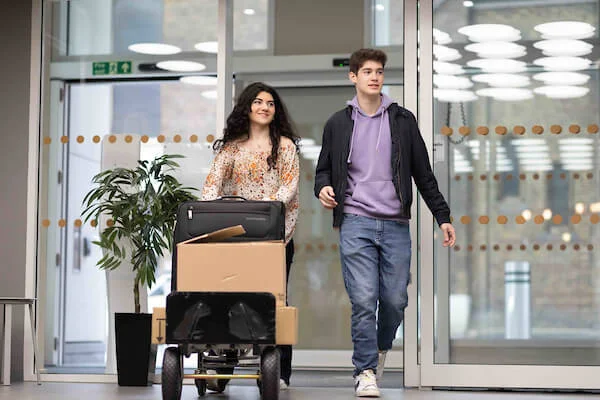
How To Apply For A Young Persons Coach card
A young persons’ coach card can be purchased using the online registration form, with the travel card then delivered to your home address within 7 days. Alternatively, you can call National Express who can arrive delivery of your student travel card for you.
With student living throughout the UK, Downing Students accommodation is located within the best city central locations to ensure our students have easy access to nearby transport links for student travel. Take Vega London for example, a quick 5-minute walk away from Vauxhall Underground.
Looking to study at University of Warwick, Coventry? You are in luck! When you book your next home away from home at City Village student living you get a FREE, yes FREE bus pass! Hurry, this offer won’t be around for much longer!
Like to learn more? We would love to hear from you!
Join in the Downing Students fun right here
Downing Student Life
10th May 2024
TIME MANAGEMENT SKILLS FOR STUDENTS
7th May 2024
UCAS DISCOVERY HOUSING EVENTS
22nd April 2024
EASY WAYS TO EARN MONEY ONLINE AS A STUDENT
19th April 2024
TOP UK FESTIVALS TO VISIT THIS SUMMER

Travel in London
Getting to ucl, transport options in london, getting around and travel discounts, driving in the uk.

Your transport options for getting to UCL from the main London airports, including various routes and costs.
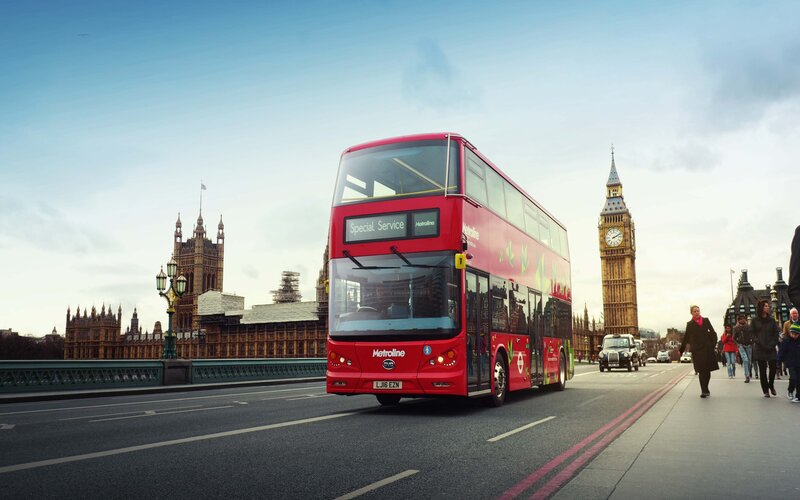
There are various ways of travelling around London depending on where you are living and your preferences.
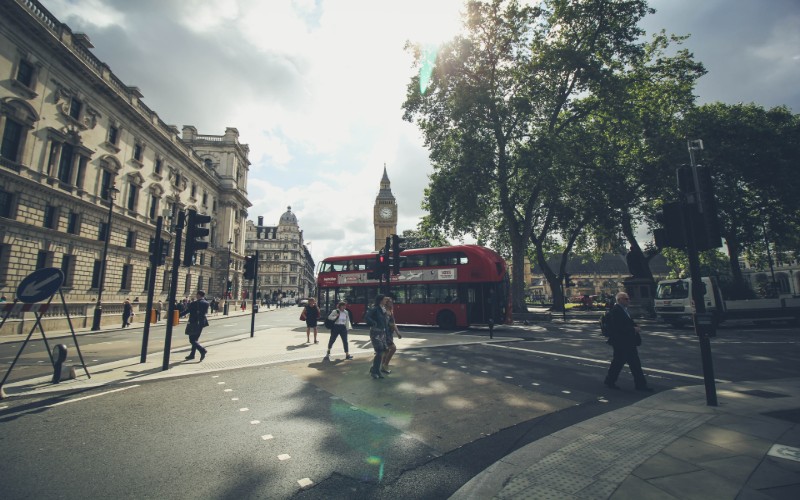
Information on how to get around campus, how to obtain an Oyster card and the student discounts you can access.

Driving on a non-GB licence, car renting and useful information to know before you start driving in the UK.
MediaCentral Widget Placeholder https://mediacentral.ucl.ac.uk/Player/Hcd1FhiI

Everything students need to know about Travel Cards. Get your discount on Transport for London!
Traveling around London can be quite expensive for students. Luckily, all full-time undergraduate and postgraduate students aged 18 and over are eligible for a Student Oyster Photocard (student travel card London). This card gives them a 30% travel discount on most Transport for London services, including buses, the underground and trains.

If you’re 18 or over, live at a London address during term time and in full-time education, or on a mandatory work placement in London, you may be eligible for an 18+ Student Oyster photocard .

If you’re 18 and live in London, you may still be eligible for a Zip 16+ Oyster photocard which offers half-price travel on rail services and free travel on buses.
To apply for student travel card London, you must be enrolled:

- With a school, college or university that’s registered on the TfL scheme
- On a mandatory work placement in London or
- On an eligible full-time or part-time course
You can top up your pay as you go credit and buy Travelcards for your 18+ Student Oyster photocard online.
You can only do this via your 18+ Student Oyster photocard account. If you try to buy a Travelcard via a contactless and Oyster account, you will be charged the full adult price. 16-25 Railcard is a perfect solution for students who travel a lot by train. It costs £30 a year and gives you a third discount on all UK rail travel. You can get a 12% discount with the NUS Extra card .

The National Express Young Persons Coachcard costs £10 a year and gives people aged 16 to 26 a 1/3 discount on full National Express bus tickets for travelling to anywhere in the UK.
3 thoughts on “Everything students need to know about Travel Cards. Get your discount on Transport for London!”
Hurrah! After all I got a web site from where I know how to really take valuable facts concerning my study and knowledge.
Very useful information. Amazing article! Well done!
To the unibritannica.com webmaster, You always provide clear explanations and step-by-step instructions.
Leave a Reply Cancel reply
Your email address will not be published. Required fields are marked *
Sign me up for the newsletter!
Places on our 2024 summer school are filling fast. Don’t miss out. Enrol now to avoid disappointment
- 14 Great Ways to Get Cheaper Student Travel Around the UK and Beyond
In a post-recession age when money is tight for all of us, finances are likely to be an ever-present worry when you’re still at school and earning only a modest income from a part-time job or pocket money.
You should also read…
- 12 Ways for University Students to Get Funding and Save Money
- Summer Travel: Where You Should Go and Why
One of the major costs you’re likely to have to consider in order to enjoy life in your spare time is transport. Whether you’re commuting to and from school, going to visit friends or relatives, or planning a day trip or holiday in the UK or beyond, it pays to be aware of the many ways in which you can make significant savings on the ever-increasing cost of travel. The tips and tricks in this article will show you that the high cost of transport doesn’t have to stand in the way of your plans.
1. Get the coach between cities with Megabus

Prepare to be amazed at the phenomenally cheap prices offered for coach journeys by Megabus , which offers cheap bus and train travel between UK cities and even over the Channel to various European cities. With fares starting at less than £1.50, Megabus offers significant savings over the cost of rail travel and means you won’t have to nag your parents to drive you to places anymore!
2. Save a third on rail travel using the 16-25 Railcard
If rail travel is unavoidable, you can save a third off the cost of train tickets with a 16-25 Railcard . Though you’ll have to pay for it – it costs £30 for a year or £70 for three years – it will quickly pay for itself in the money you’ll save. It’s valid on all Standard and First Class Advance fares, and the only restriction is that a minimum fare of £12 will apply if you travel between 4.30am and 10am midweek, except in July and August. Because of this restriction, and the fact that the 16-25 Railcard won’t get you a discount off the price of a season ticket, it’s unfortunately not an ideal solution if you’re using the train for a daily commute to school. However, if you’re likely to travel by rail at the weekends, or for day trips, it will quickly prove its worth. The 16-25 Railcard also entitles you to a huge number of discounts on days out, restaurants, holidays and so on, so it allows you to save money on other things as well.
3. Perfect the art of split ticketing

Who knows how the ‘powers that be’ decide how train tickets should be priced, but a weird loophole in ticket pricing structures means that it’s sometimes cheaper to book tickets separately for each leg of your journey than it is to book a single ticket for the entirety of your journey. For example, a ticket from Oxford to Birmingham costs around £30. However, if you were to buy a ticket from Oxford to Banbury, and a separate one from Banbury to Birmingham, you might well find that your journey works out cheaper. Don’t ask us why – it’s just the way it is! Luckily, a number of apps and websites exist to help you calculate and compare the costs of splitting journeys; here’s some more information on split ticketing from Raileasy . Splitting your tickets in this way is totally legitimate – all that matters is that each individual ticket is valid and that the train you’re on does actually stop at the destination printed on the ticket. You don’t even need to get off the train you’re on! It’s baffling, but it works.
4. Book train tickets 12 weeks in advance
If you know well in advance that you’re going to be travelling somewhere on a certain date – to a wedding, for example – you can make substantial savings by booking your train ticket at least 12 weeks in advance. According to thetrainline.com , booking in advance can save you an average of 43%; sometimes much more. If you’re ordering tickets online in advance, you can also save money by electing to pick up the tickets at the station on the day, rather than having them posted to you for an extra fee. Just don’t forget to take the debit or credit card you booked with for proof of purchase (if your parents booked for you, you’ll need to get them to come along to the station with you to collect the tickets from the machine).
5. Get an Oyster Card if you go to London regularly
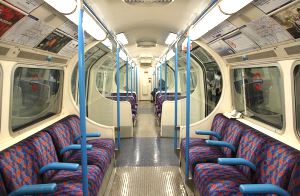
For cheaper travel around London, if it’s something you do regularly, it’s well worth acquiring an Oyster Card . This is valid on all London buses, the London Underground, Tram, Docklands Light Railway (DLR), London Overground and most National Rail services within London. It’s a pre-paid smartcard that you top up with credit in a similar way to how you top up pay-as-you-go mobile phones, and it gives you cheaper travel across the London transport network, capping prices each day to avoid you having to spend more than necessary. To get an Oyster Card, all you have to do is sign up online (or at a London Underground station, Oyster Ticket shop or various other locations) and put down a £5 deposit (refundable if you ever want to return your card, along with any remaining credit). If you’re only going to London for the day, a London Travelcard would be more appropriate.
6. Take advantage of Sail & Rail deals to Ireland
Organising a last-minute trip to Ireland? Then you can take advantage of the RailSail deal from Irish Ferries, which offers combined train and ferry tickets from just €42 (about £34) per person, each way (also bookable through thetrainline.com ). The flat-rate fare depends on how far you are from the port, calculated by which zone you fall into – a bit like the zones on the London Underground. It’s ideal for last-minute trips because the fare doesn’t change, even if you book on the day. Even better, you can take two bags of any weight with you, and you don’t have to take a passport.
7. The six week flight-booking rule

Turning to air travel now, and once again the amount of time you leave booking your flight can have a huge impact on the price you pay. Contrary to what you might expect, prices are often hiked for last-minute travel, so unless it’s totally unavoidable, try not to leave booking until just before you travel. For the budget airlines Ryanair and Easyjet , the optimum booking time for the cheapest prices is thought to be around six weeks in advance. On average across all airlines, research has shown that five weeks in advance is the optimum booking time.
8. Shop around for the cheapest flights
As with many purchases, it’s a good idea to shop around to get the best deal when it comes to buying flights. The good news is that there are lots of websites designed to help you do just that; SkyScanner , Cheapflights and Flightchecker are just three examples. You’ll need to compare airlines every time you fly, as there’s unfortunately no single airline that guarantees that they’ll always have the cheapest prices for every destination at every time of day, week or year. Also, don’t forget that sometimes, the budget airlines aren’t actually cheaper than an airline such as British Airways, so don’t rule out these supposedly more expensive carriers.
9. Be flexible with your travel dates and times

Further savings can be made if you’re able to be flexible about the dates and times you fly. This is because being flexible allows you to take advantage of the times of the day and week when fewer people travel, when airlines lower their fares to encourage more people to book. For example, flights at awkward times of the day, such as very early in the morning or very late at night, are often cheaper, so if you don’t mind disrupting your sleeping pattern temporarily, you should be able to save money.
10. Book a package holiday just for the flight
Companies such as First Choice and Thomas Cook offer great prices on all-inclusive holidays – breaks that include the flight, accommodation, food and drinks. The prices are so good, in fact, that it can sometimes be cheaper to book an entire package holiday than to buy the flights on their own. So, even if you already have accommodation sorted (staying with relatives, for instance), it’s worth taking a look at the package deals available to see if they work out cheaper than the cost of a flight on its own. You’re under no obligation to stay in the hotel that comes with the package deal if you don’t want to.
11. Avoid paying for luggage

Many airlines charge for any luggage that weighs over its prescribed limits, whether the overweight luggage is checked or cabin bags. Some also charge you to check in any bag and limit you to just one item of hand luggage. However, if you’re canny about it, you can easily avoid paying anything for your luggage. A golden rule is always to travel light, ideally keeping your luggage to a single item of cabin luggage. The other consideration is that most major UK airports don’t weigh your hand luggage – they measure it. So if you are checking a suitcase in, and it’s close to the weight limit, take some items out of it and put it in your hand luggage instead. Hand luggage on Ryanair and Easyjet doesn’t usually get weighed in Gatwick, Luton, Manchester, Edinburgh, Stansted or Birmingham (or Dublin, going outside the UK). Furthermore, if you’re carrying your luggage, such as a rucksack, rather than using a wheeled suitcase, the airport is much less likely to check its measurements. However, always check the luggage requirements of the individual airline before you fly – they’re all different, and you can avoid being caught out at the airport and having to pay extra simply by doing a little research in advance.
12. Don’t fly directly into Germany
Sometimes it’s the lesser-known factoids that can save you money. For example, if you’re heading for Germany, you can save money by flying into a neighbouring country if your destination is anywhere near a border. This is because the country has high airport taxes, and it can work out cheaper to fly into Poland or the Netherlands and get a train into Germany instead. The same principle could apply elsewhere, so it’s worth checking out prices to different airports even if they’re in a neighbouring country, as doing so could prove substantially cheaper (and it can mean the difference between being able to fly with a budget airline or not, if your destination airport isn’t served by a budget carrier).
13. Share a lift

Another cheap way to travel is sharing a lift, either with friends or through a website such as Liftshare , National CarShare or Mylifts.com . These websites allows you to share journeys with others, clubbing together either on a regular basis or for a one-off trip, such as to a sporting event or festival. You pay the driver a share of the petrol costs, so you both benefit. You have to be 18 or over to use these services, and Lifeshare has a good list of safety tips to ensure you travel safely. This could be a good option if you need to get to somewhere that isn’t well-served by public transport, or that’s more difficult to access.
14. Get a bike
Finally, if you want to save money on travelling around your own town or city, have you thought about getting around by bike? Many places have dedicated cycle lanes to increase your safety, and as well as saving you a huge amount of money on bus or train fares, you’ll keep fit as well! If you have any other cheap travel tips you think we’ve missed, we’d love to hear them! Leave a comment below and help others save.
12 Best Places To Live In London: Cost, Attractions & More!
Link Copied
Share on Facebook
Share on Twitter
Share on LinkedIn
.jpg)
Your London adventure awaits!
Situated along the River Thames, London is known for its spectacular history, thriving culture, urban vibes, and great food. Every year, thousands of students come to London to pursue their higher education. As we start on the journey through the city's vibrant tapestry, we'll uncover the gems or the best places to live in London in its diverse neighbourhoods. Each of the places to live in London offers its unique charm and allure. From the trendy streets of North London to the tranquil banks of the Thames in the West, let's explore some of the finest locales London has to offer for students.
Best Places to Live in London- North London
From the vibrant markets of Camden to the leafy avenues of Islington, North London beckons with its promise of exciting adventures and vibrant community spirit. Join us as we delve into the best places to live in London when it comes to the dynamic and vibrant North. It is a thriving corner of the capital where students can find not only a place to call home but also a vibrant hub for learning, leisure, and cultural exploration. Shall we start?
Cost of Accommodation: £450 to £1500/ Month Must-visit: Camden Town, Buck Street Market, and Music Walk of Fame
One of North London's liveliest districts, Camden is situated just north of St Pancras, the capital's only international terminal. Camden also features some of London's top live music venues, including the iconic Roundhouse and Electric Ballroom. One of the fastest-growing education hubs, Camden is home to top universities such as the University of Westminster, Rutgers University, and the University College of London. Rutgers University alone hosts more than four thousand students annually in its undergraduate courses. The part of the city also comes with a lot of options for part-time jobs in travel, food and IT industry, making it a favourite part of the city for students. There are many parks nearby, but Primrose Hill, with its breathtaking views of the city, is probably your new favourite. You will find a wide variety of options for student housing in Camden , which cater to every student's needs. Truly one of the best areas to live in London.
2. King’s Cross
Cost of Student Accommodation: £500 to £1100/ Month
Must-visit: Camley Street Natural Park, The Granary Square Fountains, Canopy Market, and Regent’s Canal.
The next wonder of London is King Cross, located in the heart of London, England. Known amongst the best places to live in London for its educational grandeur. The presence of trailblazing and red-brick universities like the King’s College London spread over five campuses across London. Students seeking the best of everything move to the King’s Cross. Apart from the exceptional campus life, King’s Cross also offers numerous cafes, restaurants, and bars, making it one of the best neighborhoods to stay in London. There are many student accommodations in King Cross , among the best areas to live in London!
Iconic Stays In The City That Never Sleeps!
Book through amber today!
3. Islington
Cost of Accommodation: £550-£780/Month.
Must-visit: Emirates Stadium Tour and Museum, Angel Comedy at the Camden Head, Almeida Theatre, and Finsbury Park.
Islington is known as one of the best areas to live in London, as it is a part of the famous Middlesex county. What makes Islington one of the best places to live in London? Islington's bustling business core contrasts with its Victorian homes and quiet backstreets. There are countless pubs, bars, restaurants, diners, cafés, clubs, museums, galleries, and parks to hang out with friends and keep busy in one of the best neighborhoods in London. Islington offers an amazing collection of student accommodation, too, making it one of the best places to live in London.
Best Places To Live In London- South London
South London is a captivating blend of old-world charm and modern vibrancy. It is enticed by its meandering streets, lush green spaces, and a rich tapestry of cultures. It also tops the list of the most affordable places to live in London. From the bustling markets of Brixton to the serene tranquillity of Richmond Park, it's a melting pot of diversity and community. Let us explore the best places to live in London when it comes to the southern part of it:
Cost of Accommodation: £400 to £1335/ Month
Must-visit: Oxford Street, Carnaby Street, St. Patrick Church, and Museum of Soho
Soho lets you be as central as you can be in London. Soho’s bustling streets and vibes will never let you have a dull moment. It is among the choicest neighbourhoods to live and it boasts of being the best place to live in London. But why? Home to many theatres and a great lineup of cute and cosy cafes. Intricate and finest line up of boutiques, stores and much more. Soho also has the hottest nightlife you can ever imagine. A combination of it all makes it one of the best neighborhoods in London, providing convenient and comfortable Soho student accommodation .
Must-visit: Putney Bridge, Putney Heath, Wimbledon Lawn Tennis Museum, Fulham Places, and Branes Common
Looking for a calmer location that is still conveniently close to central London? Putney is the place for you! As one of the best neighbourhoods to live in South West London, it fills you with an unknown energy. You soak in the charm of the market town and a variety of regional independent shops, national chains in Central Putney, and pubs in Putney. Enjoy a nice evening walk or a run along the paths of the Thames’ lush banks, or visit Richmond Park. It is indeed one of the best places to live in London, which will make you feel at home.
3. Southwark
Cost of Student Accommodation: £1,020 to £1200/ Month
Must-visit: The Antique Breadboard Museum, Fulham Palace, Sambrook’s Brewery Heritage Centre, and Putney Arts Theatre.
When it comes to breathtaking views, thrilling activities, and mouthwatering food and drink selections, Southwark has it all! It is one of the best places to live in London because of all the activities to do in this extremely central location if you want to take pictures. The Shard is the place to go if you want to capture a nice aerial shot of the city. The town is ideal for all ages to explore and travel and is also one of the best areas to live in London.
Best Places To Live In London- East London
East London captivates with its eclectic energy, vibrant street life, and cultural diversity. From the trendy streets of Shoreditch to the historic charm of Walthamstow, it offers a rich tapestry of experiences. With excellent transport links, a dynamic arts scene, and a thriving culinary landscape, East London stands as one of the best places to live in London.
1. Shoreditch
Cost of Accommodation: £400 to £1275/ Month
Must Visit: Wesley’s Chapel & Museum of Methodism, Hoxton Hall, and Bounce Old Street.
The next best place to live in London is Shoreditch, located in the London East End, in the London Borough of Hackney. Shoreditch’s Elizabethan Theatre makes it a centre and a popular entertainment area. Shoreditch offers intriguingly diverse neighbourhoods that blend youthful hipsters, residents, city professionals, and celebrities. It tops the list of the best clubs in London . It is indeed one of the best places to live in London! You also find a diverse range of comfortable student accommodations in Shoreditch .
2. Walthamstow
Must Visit: William Morris Gallery, Vestry Hosue Museum, Lloyd Park, God’s Own Junkyard
Walthamstow shines as one of the best neighbourhoods to stay in and one of the most beautiful places in London to live for students. It offers a vibrant community, diverse culture, and excellent transport links. With trendy cafes, bustling markets, and cultural hotspots, it blends urban convenience with suburban tranquillity. Its thriving arts scene and green spaces add to its charm, making it an unbeatable choice and one of the best places to live in London.
Best Places To Live In London- West London
West London is one of the best places to live in London for students seeking a balance of an upbeat urban lifestyle and some quiet of the old-world charm. The area is known for its renowned institutions, vibrant community life, and great bars and restaurants. Explore the best places to live in London West with us.
Cost of Accommodation: £100 to £835 per week
Must Visit: Royal Academy of Arts, Burlington Arcade, The Royal Institution, and Shepherd Market
Mayfair is considered one of the affluent and classiest areas in London. Being an affluent area, students will find Mayfair to be a comfortable and welcoming place. It is also among the most attractive, vibrant, secure, and best areas to live in London. Along with expensive eateries, it also has several eateries and cosy cafes. Mayfair also offers a happening nightlife for students. Chapter Islington is a popular student accommodation here. It is a great choice when choosing the best place in London to live!
2. Notting Hill
Cost of Student Accommodation: £2000 to £2500/ Month
Must-visit: Trellick Tower, Holland Park, Holland House, Kyoto Garden, Kensington Central Library, Philimore Walk
Notting Hill epitomises the allure of London living with its picturesque streets, vibrant atmosphere, and rich cultural heritage. Renowned for the iconic Portobello Road Market, where treasures await among antique stalls and artisanal delights, it's a haven for shoppers and food lovers alike. The charming pastel-coloured houses, leafy squares, and hidden gardens of one of the best neighborhoods to stay in London create an idyllic backdrop for strolls. With its proximity to Hyde Park , the vibrant Notting Hill Carnival , and the eclectic mix of boutiques and cafes along Westbourne Grove , Notting Hill offers a lifestyle that seamlessly blends elegance and excitement in the heart of the city.
3. Kensington
Must-visit: Kensington Palace, Victoria & Albert Museum, Hyde Park, Natural History Museum, and Royal Albert Hall.
One of the most beautiful and best areas to live in London, Kensington is filled with many restaurants and cafes and many things to do to keep you entertained throughout. To make your tube travel life easier around the nearby areas of the neighbourhood, you can use the London Underground . Kensington's restaurants serve a vast range of foods and beverages from practically every country in the world. Find affordable student accommodation in Kensington at iQ Sterling Court . All these factors make Kensington the best place to live in London!
4. Marylebone
Cost of Student Accommodation: £400 to £1280 per week.
Must-visit: Sherlock Holmes Museum, The Sportsman Casino, Marylebone Farmers’ Market, and Anaesthesia Heritage Centre.
Marylebone is a neighbourhood in London's West End, in the City of Westminster. It is one of the best places to live in London as it features a range of fancy restaurants where you can enjoy mouth-watering delicacies. You will find tons of exciting things to do in this area. The beautiful Victorian architecture here will be a perfect background for your next Instagram post. The bustling Marylebone High Street , where you can explore various pubs and cafés, lies at the centre of the neighbourhood. Student Accommodation in Marylebone is to die for and is available in various choices.
With so many best places to live in London, the city truly is a wonderful study destination for students. Each place in the city offers something unique for locals or visitors. From museums, historical sites and gardens to shopping centres, thrift stores, cafes, and clubs, London offers various attractions and activities for locals and visitors alike. One will not have a dull moment ever while staying in London. If you plan to study in London, you might be concerned about the accommodation. Check out these amazing options for student accommodation in London, like Drapery Place and The Park Lane Collection . I hope this blog will help you decide the best area to live in London!
Frequently Asked Questions
What are the best places to live in london, what is the most affordable student housing option in london, which is the most posh area of london, how do i decide the best place to live in london, what is the cost of living in london for international students.
Your ideal student home & a flight ticket awaits
Follow us on :

Related Posts

Student Oyster Card: Benefits, Types, Balance Checking And Top-Ups
.jpg)
Beyond Borders: A Comprehensive Guide to the UK, Great Britain, and England

Toronto vs Vancouver For Students: Where To Live In 2024?

Planning to Study Abroad ?

Your ideal student accommodation is a few steps away! Please fill in your details below so we can find you a new home!
We have got your response

amber © 2024. All rights reserved.
4.8/5 on Trustpilot
Rated as "Excellent" • 4800+ Reviews by students
Rated as "Excellent" • 4800+ Reviews by Students
Best Institutions To Study Travel And Tourism In London
- Last updated May 10, 2024
- Difficulty Beginner
- Category Travel

Are you passionate about the travel and tourism industry? Dreaming of a career that allows you to explore the world and help others create unforgettable memories? Look no further than London, the vibrant and bustling capital of the United Kingdom. With its rich history, diverse culture, and countless tourist attractions, London is the perfect city to study travel and tourism. And when it comes to finding the best institutions to pursue your education in this field, London offers a plethora of options. From world-renowned universities to specialized schools, this city has it all. Join us as we explore the best institutions to study travel and tourism in London, and get one step closer to living your dream career.
What You'll Learn
Top universities and colleges in london for travel and tourism studies, study abroad programs in london for travel and tourism students, the best vocational schools and institutes for travel and tourism in london, online and distance learning options for travel and tourism studies in london.

London is a vibrant and diverse city that attracts millions of tourists each year. If you have a passion for travel and tourism and want to pursue a career in this exciting industry, London is an excellent place to study. With numerous top universities and colleges offering specialized programs in travel and tourism, you can gain the knowledge and skills needed to succeed in this field. Here are some of the top institutions in London for travel and tourism studies.
University of Westminster:
The University of Westminster is renowned for its tourism and events management programs. It offers undergraduate and postgraduate degrees in tourism, events, and hospitality management. With a strong focus on practical industry experience and a network of industry connections, this university provides valuable opportunities to gain hands-on experience and develop a solid foundation in the travel and tourism sector.
London School of Economics and Political Science (LSE):
LSE offers a unique opportunity to study travel and tourism from a social science perspective. Its renowned Department of Geography and Environment offers a variety of courses in human geography, including tourism and development. LSE's emphasis on critical analysis and research skills can provide you with a deeper understanding of the social, cultural, and economic aspects of tourism.
University of Greenwich:
The University of Greenwich offers a range of tourism-related degrees, including International Tourism Management, Tourism Management, and Tourism and Hospitality Management. Its location on the banks of the River Thames provides students with access to some of the most popular tourist attractions in London, making it an ideal place to study and immerse yourself in the tourism industry.
University College London (UCL):
UCL offers a Master's degree in Tourism, Environment, and Development, which focuses on sustainable tourism practices. This program explores the relationship between tourism, nature, and culture, and emphasizes the need for responsible tourism management. UCL's strong academic reputation and cutting-edge research in sustainability make it an excellent choice for those interested in the environmental aspect of the travel and tourism industry.
King's College London:
King's College London offers a Tourism, Environment, and Development MSc program that examines the socioeconomic and environmental impacts of tourism. This interdisciplinary course combines aspects of geography, economics, and anthropology to provide a holistic understanding of the challenges and opportunities in the tourism sector. The university's central location and strong ties to industry professionals offer excellent networking opportunities for aspiring tourism professionals.
City, University of London:
City, University of London offers a BSc in Tourism Management, which covers a wide range of topics, including tourism planning, marketing, and entrepreneurship. This program equips students with the necessary skills to excel in various roles within the tourism industry, such as destination management and tour operations. With its central location in London, City University offers easy access to internships and job opportunities in the tourism sector.
These top universities and colleges in London provide excellent academic programs and opportunities to gain practical experience in the travel and tourism industry. Whether you're interested in tourism management, sustainable tourism, or tourism development, London has a range of options to suit your interests and career goals. Studying in London will not only give you access to world-class education but also expose you to the thriving tourism industry of one of the most popular destinations in the world.
The Best Accommodation Options for Solo Travel in Bangkok
You may want to see also
If you are interested in studying travel and tourism in London, you are in luck! London is one of the most popular cities in the world for studying abroad, and it offers a wide range of programs for students interested in this field. Whether you are interested in earning a degree or simply gaining practical knowledge and experience, there are plenty of options to choose from. Here are some of the best study abroad programs in London for travel and tourism students:
- The University of Westminster: The University of Westminster offers a variety of programs in travel and tourism, including undergraduate and postgraduate degrees. Their courses cover a wide range of topics, from tourism marketing to cultural heritage management. The university is located in the heart of London, giving students access to some of the city's top tourist attractions and industry professionals.
- London South Bank University: London South Bank University offers a Bachelor of Arts in Tourism and Events Management, which is ideal for students who want to specialize in events planning, destination management, or tourism marketing. The university's location in central London makes it easy for students to gain industry experience through internships and practical projects.
- University of Greenwich: The University of Greenwich offers a Bachelor of Arts in Tourism Management, which covers everything from sustainable tourism to travel and tourism law. The university is known for its practical approach to education, and students have the opportunity to gain real-world experience through industry placements and field trips.
- Birkbeck, University of London: Birkbeck offers a Master's degree in Tourism, Environment, and Development, which is aimed at students who want to study the social, economic, and environmental impacts of tourism. The program is flexible, allowing students to study part-time or full-time, and it is taught by world-leading experts in the field.
- University of Roehampton: The University of Roehampton offers a Bachelor of Arts in Tourism and Hospitality Management, which provides students with a solid foundation in the theory and practice of managing tourism and hospitality businesses. The university's location in southwest London offers easy access to major tourist attractions and a thriving hospitality industry.
These are just a few examples of the study abroad programs available in London for travel and tourism students. Before making a decision, be sure to research each program's curriculum, faculty, and industry connections to ensure that it aligns with your career goals. Don't forget to consider factors such as location, cost, and student support services as well. With so many options to choose from, London is an excellent destination for anyone looking to study travel and tourism abroad.
Top 10 European Destinations to Explore with a Schengen Visa
London is a vibrant and bustling city, known for its rich history, iconic landmarks, and diverse culture. It comes as no surprise that it is also a popular destination for tourists from all over the world. If you are passionate about travel and tourism, there is no better place to study than in London, where you can gain hands-on experience and be surrounded by the industry's leading professionals. Whether you are interested in becoming a travel agent, tour guide, or hotel manager, London offers a range of vocational schools and institutes that will equip you with the skills and knowledge you need to excel in this exciting field.
One of London's top vocational schools for travel and tourism is the London School of Hospitality and Tourism. Located in the heart of the city, this institution offers a variety of courses and programs designed to prepare students for careers in the travel and tourism industry. From travel management to hospitality management, the school provides a comprehensive education that combines practical skills with theoretical knowledge. Students will have the opportunity to learn from experienced industry professionals, take part in internships, and gain valuable hands-on experience. The London School of Hospitality and Tourism also has strong connections with industry partners, providing students with excellent networking opportunities.
Another excellent option is the City College, which offers a range of vocational courses in travel and tourism. Located near the bustling West End and surrounded by major tourist attractions, the college provides a perfect environment for students to immerse themselves in the industry. The college offers courses that cover various aspects of travel and tourism, such as tour operations, retail travel, and airline cabin crew. With modern facilities and dedicated staff, students will receive the support and guidance they need to succeed in their chosen career path. The City College also has strong industry links, offering students valuable opportunities for work placement and networking.
For those looking for a more specialized education, the London School of Economics and Political Science offers a degree in International Tourism Management. As one of the world's leading social science institutions, the school provides an academic approach to the study of travel and tourism. Students will gain a deep understanding of the economic, social, and environmental impact of tourism, as well as develop analytical and strategic thinking skills. The degree also includes a focus on sustainability and responsible tourism, ensuring that graduates are well-prepared for the future challenges of the industry. With its prestigious reputation and strong alumni network, a degree from the London School of Economics and Political Science will open doors to exciting career opportunities.
If you are looking for a more hands-on approach, the International Career Institute offers a range of online courses that allow you to study at your own pace. With flexible schedules and personalized support, you can learn the fundamentals of travel and tourism from the comfort of your own home. The institute offers courses in travel and tourism management, tour guiding, and hospitality management, providing you with the skills and knowledge you need to excel in the industry. With its globally recognized certifications, the International Career Institute ensures that graduates are well-prepared for a successful career in travel and tourism.
In conclusion, London offers a range of vocational schools and institutes for studying travel and tourism. Whether you prefer a traditional classroom setting or the flexibility of online learning, there is a program that will suit your needs and aspirations. With its vibrant tourism industry and strong professional networks, studying in London will provide you with the skills, knowledge, and connections you need to succeed in the exciting field of travel and tourism. So why wait? Start your journey to an exciting career in travel and tourism in London today!
A Step-by-Step Guide to Obtaining a Travel Visa for Bahrain
If you're interested in studying travel and tourism in London, but are unable to attend traditional in-person classes, there are still excellent online and distance learning options available to you. These programs allow you to gain a comprehensive understanding of the travel and tourism industry from the comfort of your own home, with the flexibility to study at your own pace and fit your education around your existing commitments.
One esteemed institution offering online and distance learning options for travel and tourism studies in London is the London School of Hospitality and Tourism. This school is a part of the University of West London, a highly respected institution known for its exceptional hospitality and tourism programs.
The London School of Hospitality and Tourism offers a range of online programs in travel and tourism, including undergraduate degrees, postgraduate degrees, and professional development courses. These programs cover a wide range of topics related to the travel and tourism industry, such as tourism management, destination marketing, sustainable tourism, and event planning.
The online courses at the London School of Hospitality and Tourism are designed to provide students with a rich and engaging learning experience. They feature interactive lectures, multimedia resources, and opportunities for students to collaborate with their peers. The school also provides extensive support to online students, with dedicated tutors and academic advisors available to answer any questions and provide guidance throughout the course.
Another option for online and distance learning in travel and tourism is the University of London. This renowned institution offers several fully online programs related to tourism and hospitality management. These programs cover a wide range of topics, including tourism marketing, tourism planning and development, and sustainable tourism management.
The University of London's online programs in travel and tourism are flexible and customizable, allowing students to choose the courses that align with their interests and career goals. The courses are designed to be interactive and engaging, with opportunities for students to participate in discussions and collaborate with their peers. The university also provides extensive support to online students, including access to resources and academic support services.
In addition to these institutions, there are a variety of other online platforms and educational providers that offer courses and certifications in travel and tourism. These options range from short courses and certifications to more in-depth programs. Some popular online learning platforms to consider include Coursera, Udemy, and edX, which offer a wide selection of travel and tourism courses taught by industry professionals and experts.
When choosing an online or distance learning program for travel and tourism studies in London, it is important to consider factors such as accreditation, course curriculum, and the reputation of the institution or platform. Be sure to thoroughly research the program and read reviews from past students to ensure that it aligns with your educational and career goals.
In conclusion, if you are unable to attend traditional in-person classes, there are excellent online and distance learning options available for studying travel and tourism in London. Institutions such as the London School of Hospitality and Tourism and the University of London offer comprehensive and flexible online programs in travel and tourism. Additionally, there are several online platforms and educational providers that offer travel and tourism courses and certifications. Take the time to research and choose the program that best suits your needs and interests, and embark on your journey towards a successful career in the travel and tourism industry.
Exploring Canada on an H4 Visa: Your Ultimate Travel Guide
Frequently asked questions.
There are several institutions in London that offer travel and tourism courses, such as the University of Westminster, London Metropolitan University, and the London School of Economics and Political Science.
The entry requirements vary depending on the institution and level of study. Generally, a high school diploma or equivalent is required for undergraduate programs, while postgraduate programs may require a bachelor's degree in a related field.
Some institutions in London offer scholarships specifically for travel and tourism students, such as the University of Westminster's scholarship for the Tourism and Events Management program. Additionally, there are external scholarships and funding options available for international students.
Yes, there are online courses available for studying travel and tourism in London. Institutions like the Open University and London School of Business and Finance offer online programs in this field.
Studying travel and tourism in London can lead to a wide range of career opportunities, including working as a travel agent, tour operator, event planner, hotel manager, or marketing executive in the tourism industry. Graduates may also find employment in government tourism departments or start their own travel businesses.

- Pop Panupong Author Reviewer Traveller

- Duke Trotter Author Editor Reviewer Traveller
It is awesome. Thank you for your feedback!
We are sorry. Plesae let us know what went wrong?
We will update our content. Thank you for your feedback!
Leave a comment
Travel photos, related posts.

The Average Group Size of Travellers in Intrepid's Tours: A Comprehensive Overview
- May 11, 2024

Essential Travel Accessories: Options for Storing Syringes on the Go
- May 12, 2024

The Transformative Power of Foreign Travel on Society
- May 08, 2024

When Distance Comes Between: How to Keep the Love Alive When Your Husband Travels

Understanding the Visa Requirements for Traveling to Bahrain
- May 06, 2024

Exploring the Convenience of Lush Mask Travel Size for Skincare Enthusiasts
Money blog: 600 new skyscrapers 'on way' for London, report finds
A reader seeks help as her employer of 24 years is bringing in a new clock-in system to pay her by the minute. Read this and all the latest personal finance and consumer news in the Money blog - and share your own problem or dispute below.
Monday 13 May 2024 19:57, UK
- Gen Z would rather deliver parcels than work in restaurants, Michel Roux Jr claims
- 600 new skyscrapers on way for London, report finds
- Money Problem: My workplace is bringing in new clock-in system to pay us by the minute - is this allowed?
- Free childcare applications open for new age band
Essential reads
- How to make sure your car passes its MOT
- 'Loud budgeting': The money-saving trend that has nothing to do with giving up your daily coffee
- How to avoid a holiday data roaming charge (while still using the internet)
- Best of the Money blog - an archive
Ask a question or make a comment
Young homebuyers are being forced to gamble with their retirement prospects by taking on ultra-long mortgages, according to a former pensions minister.
Sir Steve Webb described data - supplied by the Financial Conduct Authority to the Bank of England - as "shocking".
It suggests that more than one million new mortgages have been issued over the past three years with end dates beyond the state pension age.
The ex-Liberal Democrat MP, who is now a partner at the consultancy firm LCP, voiced fears that borrowers could be forced to raid their pension savings to clear their mortgage in a worst-case scenario.
Sir Steve saw the potential for harm in any case, as longer-term mortgages deprive people of a period running up to retirement when they could be mortgage-free and boosting their pension.
What does the data say?
- 42% of new mortgages in the fourth quarter of 2023 - or 91,394 - had terms going beyond the state pension age;
- In the final quarter of last year, people aged 30 to 39 accounted for 30,943 new mortgages lasting beyond state pension age;
- People aged 40 to 49 accounted for 32,305;
- Under-30s made up 3,676 of these mortgages;
- People aged 50 to 59 accounted for 18,854, and there were 661 who were over 70.
Mortgage rates have been rising since the end of 2021 when the Bank of England began action to tackle rising inflation.
Taking home loans with longer maturity dates tends to be more attractive when interest rates are high, as monthly repayments are lower.
You can read more on this story below...
Waitrose has become the only supermarket to receive a royal warrant from the King.
The recognition means the company has regularly provided the royal household with products for at least five years.
It also means it can use the King's coat of arms on packaging, as part of advertising or on any stationary it creates.
Waitrose was first granted a royal warrant in 1928 for supplying King George V with groceries and cleaning materials.
"We are honoured and proud that His Majesty has granted us his warrant," James Bailey, executive director of Waitrose, said.
"It means the world to all of us, and our farmers and suppliers. There couldn’t be a more powerful symbol of our commitment to service and quality, and our determination to have the highest environmental and animal welfare standards."
Waitrose was previously granted a royal warrant by the late Queen in 2002 and the King when he was Prince of Wales in 2010.
The Queen has also granted her first royal warrants, picking seven companies, including luxury department store Fortnum & Mason and the florist that supplied her coronation flowers, Shane Connolly & Company.
The royal nod could be bad news for customers, however, with a brand finance expert telling Sky News that having a royal warrant allows firms to charge a price premium.
David Haigh said his company's research estimated this to be "between 10% and 25%".
A royal warrant says a company or a product is luxurious, high quality and sustainable, he explained.
He estimates the scheme is "worth billions to UK companies and… therefore it's a very high value to the UK economy".
"And one of the reasons for that is that a lot of foreign tourists and buyers have a preference for royal warrant holder products. We found that 100% of Chinese buyers would pay in excess of 10% for a royal warrant holder product."
Read more on the Queen's choices here :
Gordon Ramsay's restaurants tripled losses to £3.4m last year, as the chef warned businesses in the industry were facing a "challenging" climate.
The chef's group spent millions opening five new restaurants in 2023, including a Lucky Cat in Manchester, a Bread Street Kitchen in Battersea Power Station and a Street Pizza in Edinburgh.
Sales at his wide-ranging establishments rose, however, by 21% to £95.6m in the year to August, according to The Telegraph.
"It's been a really hard-fought year, but at the same time an exciting year, and in tough times it amazes me how strong and vibrant our industry is," Ramsay told the news outlet.
"It's challenging out there and businesses are battling to stay afloat, rising costs, rent and food costs, multiple strikes. It's a battle"
He was optimistic, however, saying there hasn't been "so much passion and vibrancy" in the industry since he opened his first restaurant in 1998.
"We've still got something wonderful to celebrate, and I truly believe the industry has never been so exciting."
Once the UK's favourite alcoholic beverage, beer's popularity seems to be fading among the younger drinking generation...
In fact, only 30% of people aged 18 to 24 ever drink it, according to a study commissioned by the Society of Independent Brewers.
Instead, younger drinkers say they prefer drinking spirits, wine and cider.
Pub visits appear to be suffering as well, with almost a quarter of the 2,000 people surveyed saying they have never visited their local.
SIBA's 2024 Craft Beer Report paints a more positive picture for small and independent brewers, however, with more than 55% of beer consumers saying they now drink "local craft beer".
It also found average beer production volumes among independent breweries has risen by 14% since last year - a return to pre-pandemic levels for the first time in 4 years.
"Demand for local, independently brewed beer in the UK is strong, with independent brewers reporting production volumes up by 14%, meaning they have returned to 2019 volumes again," Andy Slee, SIBA's chief executive, said.
But, he said, it's time for "cautious optimism" only, with the industry still plagued with a number of issues.
"The short-term issue for small independent breweries isn't demand; it's profitability, rising costs and financial pressures such as lingering COVID debt," he said.
"Far too many breweries are simply trying to survive rather than thrive, so while there are many positives signs highlighted in the report, for now it's cautious optimism."
Earlier this year, our Money reporter Emily Mee explored whether the UK's big night out culture was dying out.
Nightlife experts warned we're losing one club every two days at the moment - and if we stay on this trajectory, we will have none left by 2030.
You can read more about her findings here...
A total of 583 skyscrapers are "queuing up in the pipeline" to be built across central London, a development thinktank has said.
That is more than double the 270 built in the past decade.
In the eastern borough of Tower Hamlets alone, 71 tall buildings were completed in that time that time, the report by New London Architecture found.
A further 24 were in the City of London and 27 in Canary Wharf and Isle of Dogs.
The report said the rapid change has been fuelled by a "burgeoning demand" for office and residential space, overseas investment and a supporting planning environment.
"Tall buildings have changed the face of London substantially over the last 20 years and will continue to do so - the pipeline that NLA has tracked means there is at least 10 years' supply that has already been defined," Peter Murray, the organisation's co-founder, said.
"London's population continues to grow, passing the 10 million mark at the end of this decade.
"We'll still need tall buildings; and NLA will continue to keep a close watch on what's going on."
Restaurants might only be able to open three or four days a week due to staffing problems, Michel Roux Jr has warned.
Speaking to The Telegraph as he gears up to open his new restaurant Chez Rouz, the Michelin starred chef admitted the industry needs to change to accommodate flexible working hours.
"Just because I worked 80 hours a week or more doesn't mean the next generation should," he said.
"Quite the contrary. That is something that we have to address in our industry."
But, he warned that the move will come at a cost...
"It will mean ultimately that going out is going to be more expensive, and that maybe your favourite restaurant is no longer open seven days a week - it's only open three or four days a week," he said.
The industry is known for its long, unsociable working hours, and Roux Jr explained that the real issue hit after the pandemic, with people no longer wanting to work weekends.
"People don't want to work unsociable hours and would rather work delivering parcels as and when they want to. It's as simple as that," he added.
Earlier this year, Roux Jr said goodbye to his famous restaurant Le Gavroche in London.
It had been opened by his father Albert Roux and uncle Michel Roux in 1967.
Now, he said it's "brave" to open a new restaurant, with the market "very, very tough".
"I really feel for anyone that is brave enough to open up a restaurant now. It's incredibly difficult," he added.
Chez Rouz at The Langham in Marylebone, central London, is due to open on 22 May.
By James Sillars , business news reporter
A pause for breath on the FTSE 100 after a 3% gain over the course of past week that took the index to a fresh record closing high.
The rally of recent weeks - significant for London's standing and pension pots alike - has been broad based and reflects several factors.
A major driver has been sterling's weakness versus the US dollar.
The US currency has been strong as the Federal Reserve, its central bank, has hinted it will be some time yet before it begins to cut interest rates.
Language out of the Bank of England last week sparked a flurry of bets that UK rates could be cut as early as next month.
A weaker pound boosts dollar-earning constituents on the FTSE 100 because they get more for their money when dollars are converted to pounds.
Also at play is the view that UK stocks represent good value, as they are cheaper compared to many of their international peers.
A few moments ago, the FTSE 100 was trading 6 points lower at 8,423.
A major talking point is the possibility of the Chinese fast fashion firm Shein listing in London.
According to Reuters, the company has shifted its focus to the UK after receiving a lukewarm reception in the United States.
The news agency, citing two sources, reported that Shein was stepping up its preparations for an initial public offering in London that would be expected to be one of the biggest carried out globally this year.
By Emily Mee , Money team
No one likes the date in their calendar when their MOT rolls around.
But to make things a little less stressful, consumer expert Scott Dixon - known as The Complaints Resolver - has given us some tips on what to look out for to help your vehicle pass with flying colours.
Some of the most common failures are faulty steering, brakes, suspension, worn or damaged tyres, cracked windscreens and faulty lights.
Mr Dixon recommends you get your car serviced a couple of weeks before your MOT, in case there are any complex or costly issues.
This will give you time to get them fixed and get your car through first time without any advisories.
Aside from taking your car for a service, there are also some easy checks you can run yourself...
Listen for unusual clunks while you're driving - this could be a sign of a damaged suspension.
You could also check by pushing the car down on each corner. It should return to normal without bouncing a few times.
Another option is to look with a torch under the wheel arch, as this should reveal any obvious defects.
Blown bulbs are a common MOT failure, but they're cheap to fix.
Walk around your car and check all the bulbs are working - this includes the headlights, sidelights, brake lights, indicators and the number plate bulb.
Mr Dixon says it's "not an easy job" to change the lightbulbs yourself on most modern cars, as the MOT will also check the positioning of the light. Therefore he recommends getting this done professionally.
Squealing or grinding noises may be a sign your brake pads need replacing.
You should also check whether your car stops in a straight line, or whether it pulls in different directions.
Don't forget about the handbrake, too. Test it out on a slope and see if it securely holds the car. If it doesn't, you should get it adjusted.
It's easy to check if your wipers work okay, but you should also make sure to inspect the blades for tears and rips.
They should be able to clean the windows with no smears.
Mr Dixon says you don't need to pay Halfords to change your wiper blade as you can "do it yourself in seconds". All you need to do is look for a YouTube tutorial.
He also recommends buying the Bosch wiper blades, as he says these are good quality and will also be a sign you've looked after your car well when you come to sell it.
One thing to look out for is tread depth. You can do this by looking for the "wear bar" that sits between the tread.
If it's close to 1.6mm and is low, you should get the tyre replaced so it's not flagged as an advisory.
Also check for perished tyre walls, which can happen when a vehicle is standing for any length of time.
Uneven tyre wear is another potential issue, and if there are signs of this you should get the tyre replaced and tracking and suspension checked.
These must be in good condition and working order, with no tears or knots.
Registration plates
Your number plates should be clean and visible with a working light bulb at the rear. You may need to give them a wipe and replace the bulb if necessary.
This should be in good condition, without damage such as loose bumpers or sharp edges.
Mr Dixon advises against using automatic car washes during your car's lifetime, saying they "wreck your car".
"It's not just your paintwork but they can also damage the wiper blades and the bodywork," he says.
Check for warning lights
You'll need to take your vehicle to a trusted garage or mechanic for this.
Exhaust emissions
Some diesel vehicles can fail their MOTs based on emissions. To avoid this, you can buy a fuel treatment pack and take your car for a good run to clear the fuel lines and tank.
Driving for at least 30 to 50 minutes at a sustained speed on a motorway or A-road should help to clear the filter.
You should make sure the driver's view of the road isn't obstructed, so check for stone chips at eye level and remove any obstructions such as air fresheners and mobile phone cradles.
What else should you think about?
Make sure your car is clean beforehand, as a tester can refuse to do your MOT if the vehicle is filthy and full of rubbish.
Giving your car a clean can also give you a chance to inspect it, Mr Dixon says.
Another thing to do is to check last year's MOT for any advisories that might crop up this time.
These potential issues will still be there - so it's best not to ignore them.
You can check your vehicle's MOT history using https://car-check.co.uk .
Every Monday we get an expert to answer your money problems or consumer disputes. Find out how to submit yours at the bottom of this post. Today's question is...
I have worked at a bank for 24 years - the facilities are outsourced. This new company is bringing in a system where the staff have to click in and out and are then paid by the minute? Is this allowed? Amber
Ian Jones, director and principal solicitor at Spencer Shaw Solicitors, has picked this one up...
Your rights depend on your contract and what it says about payment. Does it specify an annual salary, or payment by time? Does it allow for changes to how payment is calculated?
If the contract does not allow for this type of payment, your employer may be trying to vary the contract of employment unlawfully.
If you're directly employed by the bank, and your pay arrangements are changing because of a new monitoring system, this would be an internal contract variation. If you work in the facilities department and the new contractor is taking over as your employer, the Transfer of Undertakings (Protection of Employment) Regulations (TUPE) 2006 may apply.
In this case, your current terms, conditions and previous service will transfer to the new employer.
TUPE may make the issue sound more complicated but, in practice, either way the changes will be valid only if the employee agrees to them.
If you have not agreed to the change, then this could be a breach of contract. This could give rise to a successful claim in the civil courts or the employment tribunal.
If the breach is serious (for example, you're paid less than agreed in the original contract) and you resign in response, this could amount to constructive dismissal for which a claim can be made in the employment tribunal.
It would be sensible to get the contract reviewed by a solicitor for advice. But act swiftly - if you continue working for the employer, you are effectively waiving the breach and accepting the change to your contract.
To make it possible to pay by the minute, employees may be monitored while at work. When collecting and processing data and using it to make a decision, the employer must comply with data protection laws. If not, the employee could be entitled to compensation, depending on the breach, or the employer could be at risk of a sanction by the regulator the Information Commissioner's Office.
This feature is not intended as financial advice - the aim is to give an overview of the things you should think about. Submit your dilemma or consumer dispute via:
- The form above - make sure you leave a phone number or email address
- Email [email protected] with the subject line "Money blog"
- WhatsApp us here .
Please make sure you leave your contact details as we cannot follow up consumer disputes without them.
Be the first to get Breaking News
Install the Sky News app for free


How To Book A Student Discount On Emirates
- Student discount makes world travel affordable with exclusive 10% off economy and 5% off business class fares.
- Extra baggage allowance, free date changes, and straightforward booking process enhance the student travel experience.
- Booking a discounted Emirates flight is easy just follow simple steps, verify student status at check-in, and enjoy the journey.
If you are a student looking to explore the world without breaking the bank, look no further. Emirates , one of the world's leading airlines, offers special discounts for students , making it easier for them to embark on their dream adventures.
Emirates student discount
Whether you're planning a study abroad trip, a term break getaway, or simply itching to explore new destinations, securing a student discount on Emirates can make your travel dreams a reality.
From now until March 31, 2025, eligible student travelers can enjoy up to a 10% discount on economy and business class fares, with access to more than 250 destinations in the airline’s extensive network.
According to Emirates , its student discount offers:
- 10% off economy class and 5% off business class fares, excluding taxes and surcharges.
- 22 lb (10 kg) extra baggage allowance, or one extra piece of luggage in addition to the given allowance of up to 77 lb (35 kg), depending on the class of travel. Not applicable on flights to and from Canada and the US.
- Flexible options for flight changes: free date change for Flex and Flex Plus fares, and a $50 change fee for Saver fares.
Do Airlines Offer Student Discounts Or Perks?
To be eligible for the student discount, you must meet the following conditions:
- Be aged between 16 and 31 years old;
- Be a full-time student (those studying part-time courses cannot benefit from the discount, unfortunately);
- And have a valid and current student ID or acceptance letter from an accredited school, college or university of higher education.
Note that the discount can only be booked for one student per booking and cannot be applied to previously purchased tickets.
How to book
If you satisfy the eligibility criteria, you’re all set to book your discounted tickets! The process is fairly straightforward and similar to how you would book an ordinary Emirates flight ticket.
Step 1: Search for tickets on your intended route
Start by searching for your desired flight – simply visit the Emirates website or mobile app and enter your travel details, including your departure city, destination, travel dates, and class of travel. You will only be able to book for one passenger if using the student discount.
Step 2: Enter the student discount promo code
Next, in the “Promotional offers” field, enter the promo code “STUDENT” to apply the discount. Keep in mind that fares and benefits may be subject to availability, so always read the fine print before booking. It's also advised that you book your flights as early as possible to secure the best deals.
Flight Review: Emirates Boeing 777-300ER Business Class London Heathrow To Dubai
Step 3: Select your preferred flight
Once you’ve entered your flight details and promo code, you will be shown a list of available flights for your selected travel route and dates. Pick the flight you want, then proceed to the passenger details page.
Step 4: Enter your details
To proceed with your booking, you will be asked to provide your first and last names and date of birth. Make sure the names you enter exactly match your passport as this cannot be changed once you have completed your booking.
If you are a member of the carrier’s frequent flyer program, Emirates Skywards, provide your membership number to earn points on your flight. Members of select partner airline frequent flyer programs also have the opportunity to earn miles on their Emirates flight. Partner airline options are dependent on your route – for example, Qantas Frequent Flyer members can earn Qantas Points on the Dubai to Melbourne, Australia, route.
More Redemption: Emirates Skywards Members Can Now Use Points For Global Retail Purchases
Step 5: Pay for your tickets
During the booking process, you'll be prompted to provide your payment information. Once your booking is complete, you'll receive a confirmation email with your e-ticket and itinerary details. Be sure to review the terms and conditions of your booking, including any cancelation or change policies, to ensure a smooth travel experience.
Step 6: Verify your student status
Before you can take advantage of Emirates' student discounts, you'll need to verify your student status. Even if you have paid for the discounted student fare, you will not be allowed on the flight until you prove that you are a student.
Present your valid and current student ID or acceptance letter from an accredited school, college or university of higher education at check-in. Failure to do so will result in your student ticket and benefits being forfeited. Instead, a new ticket at the applicable fare on the day of the departure will be applied.
All set? Youre ready to go!
Booking a student discount on Emirates is a simple and straightforward process that can help you save money on your airfare. As seen in this article, the airline makes it easy for students to access exclusive deals and discounts on flights to destinations around the world.
With your flight booked, all that's left to do is prepare for your upcoming adventure! Whether you're jetting off to study abroad, explore a new destination, or reunite with friends and family, you can enjoy peace of mind knowing that you've scored a great deal on your Emirates flight thanks to your student discount. Don't forget to bring your student ID and any other required documentation when checking in for your flight.
Loyalty Program: Emirates Skywards


COMMENTS
London is a great city to be a student. If you've just started studying, we've got tips to help you get around, travel safely and save money on your fares. You can save 30% on Travelcards and Bus & Tram Passes with our 18+ Student Oyster photocard. You can also use this Oyster card to pay as you go ...
You'll find the best airfare to London from student airfare agencies like STA Travel. Watch for specials and you could easily pick up a return from around $500. Don't be fooled by some airlines' "student airfares" -- student airfare agencies have the real deal. Airfare sales do happen, though -- check student airfares against an aggregator's ...
Buses are often a much slower way of getting around London (especially for longer distances), ... The 16-25 railcard and the 26-30 railcard are absolute must-haves for students, saving you a third on all rail travel. But for students in London, there's a second saving: you can link it to your Oyster card and save 34% on off-peak fares. ...
Schools, colleges and universities. Schools, colleges and universities must register on the TfL Scheme so their students can apply for an 18+ Student Oyster photocard. The registration fee is £25 (non-refundable). If your location is outside London, but your students regularly commute from a London borough, you may be eligible to register.
An Oyster card allows you to travel between all parts of London on the Underground, Trams (DLR), Overground, some river boats, Emirates Air Line, and the iconic red London buses. As a student you may be eligible to apply for an 18+ Oyster which will give you 30% off on weekly, monthly, and annual travel cards! Find out more about Oyster cards here.
Take the bus to and around Zone 1 after taking the train or tube to the Zone 2 station closest to Zone 1. You will only save some money if you use a weekly or monthly Travelcard. Have a look at these prices for better understanding: Zone 1-5 weekly Travelcard is £69.60. Zone 2-5 weekly Travelcard is £40.50.
Although you can still use the Student Oyster Card for pay-as-you go travel, no additional discounts are available for single journeys, daily travel or 3 day travel. The Student Oyster Card allows you to spend less money on travel in and around London when you purchase Travelcards valid for 7 days, one month or longer periods of time (up to one ...
To make the most of your vacation, organise your days by neighbourhood or geographical area and wander from attraction to attraction. For example, visit Kensington Palace, Hyde Park, and Notting Hill on the same day, or see the Tower of London, St. Paul's Cathedral, and the British Museum. This post is for students visiting London for the ...
For all the information you need about student travel in London, visit the TFL website here. 4. Find somewhere to live using this secret TfL travel time map ... Rage Rooms In And Around London For You To Get Your Anger Out. 3 May, 2024. 43 Ways To Annoy A Londoner In Five Words Or Less. 3 May, 2024. 200 Fantastic Free Things To Do In London.
Get A Student Oyster Card To Save Money On Tube, DLR, Bus And Overground. If you are 18 or older, a student, and live in a London borough, you can use an Oyster Photocard to save money on your journeys. You will save up to 30% on the Adult-rate Travelcards and Bus & Tram Pass season tickets. You may apply online by clicking here!
The Tube is a fast and affordable way to get around the city, and many tourist attractions are located within walking distance of Tube stations. Students can purchase a student Oyster card which offers discounts and savings on transportation fares. Another important aspect of student travel to London is accommodation. There are a wide variety ...
For everyone aged 16-25 and mature students, the £30 railcard is typically paid back within 3 journeys and a must for those planning on travelling around the UK during their time at LSE. For details on how to purchase your railcard, visit the website here. You can also purchase a 26-30 railcard with the exact same perks and format as above ...
The cheapest way to travel in and around London is by making use of a student Oyster card. Students over 18 can use this card on the London Underground, red London buses, DLR trams, and a variety of other transport options. ... When it comes to travelling around London as a student, we recommend making use of London's big red buses.
Learn everything you need to know about student travel in London is our expert guide. [email protected] +44 (0) 20 7486 9020. Locations. West London. Pimlico West Kensington Earls Court Hammersmith. ... A travel app makes getting around London and exploring new areas a doddle. You'll get real-time updates, ...
The London Oyster card is a travel card that students can purchase, which can be used to travel around the city by subway or bus. Check out our complete guide on Oyster card to know more details about student travel in London. With a student Oyster card, students can save up to 30% on travelling while experiencing student life in London.
There is also the Hopper Fare which allows passengers to use an unlimited number of London buses within 1 hour for £1.65. As a full-time student you can apply for a London Transport Student Oyster photo-card, this entitles you to a 30% discount on certain travel around London.
Travelling in the city without a transport for London student oyster card will set you back a maximum of £8.90 daily (travelling through zones 1-9, which extends far beyond central London), which you can imagine adds up. ... So those are the main ways we'd recommend for students to travel around London. Now you know how to get around the place ...
Full-time students can apply for a Transport for London (TfL) 18+ Student Oyster photocard, which provides a 30% discount on travel in London. You can apply online via the dedicated TfL site and will need a digital photograph and a credit/debit card. You can check your eligibility at TfL 18+ Student Oysterwhich also includes important ...
18+ Student Oyster Card. Get yourself an oyster card for your student travel in and around London. You will save 30% with this student deal, providing you live in a London Borough during term time. An oyster card is super beneficial allowing you to buy discounted travelcards, bus and tram season tickets.
Driving on a non-GB licence, car renting and useful information to know before you start driving in the UK. Information on how to get around London, including how to use different modes of transport and how to access student discounts. On these pages you will also find guidance on how to get to UCL from London's main airports.
Traveling around London can be quite expensive for students. Luckily, all full-time undergraduate and postgraduate students aged 18 and over are eligible for a Student Oyster Photocard (student travel card London). This card gives them a 30% travel discount on most Transport for London services, including buses, the underground and trains.
How much it costs and how to pay to travel around London. Find out what's the best ticket for you and how to use contactless and Oyster cards, view fares, check if you can get a refund or replacement and see if you're eligible for free and discounted travel.
With fares starting at less than £1.50, Megabus offers significant savings over the cost of rail travel and means you won't have to nag your parents to drive you to places anymore! 2. Save a third on rail travel using the 16-25 Railcard. If rail travel is unavoidable, you can save a third off the cost of train tickets with a 16-25 Railcard.
West London is one of the best places to live in London for students seeking a balance of an upbeat urban lifestyle and some quiet of the old-world charm. The area is known for its renowned institutions, vibrant community life, and great bars and restaurants. Explore the best places to live in London West with us. 1. Mayfair
The University of London's online programs in travel and tourism are flexible and customizable, allowing students to choose the courses that align with their interests and career goals. The courses are designed to be interactive and engaging, with opportunities for students to participate in discussions and collaborate with their peers.
A reader seeks help as her employer of 24 years is bringing in a new clock-in system to pay her by the minute. Read this and all the latest personal finance and consumer news in the Money blog ...
Student discount makes world travel affordable with exclusive 10% off economy and 5% off business class fares. Extra baggage allowance, free date changes, and straightforward booking process ...